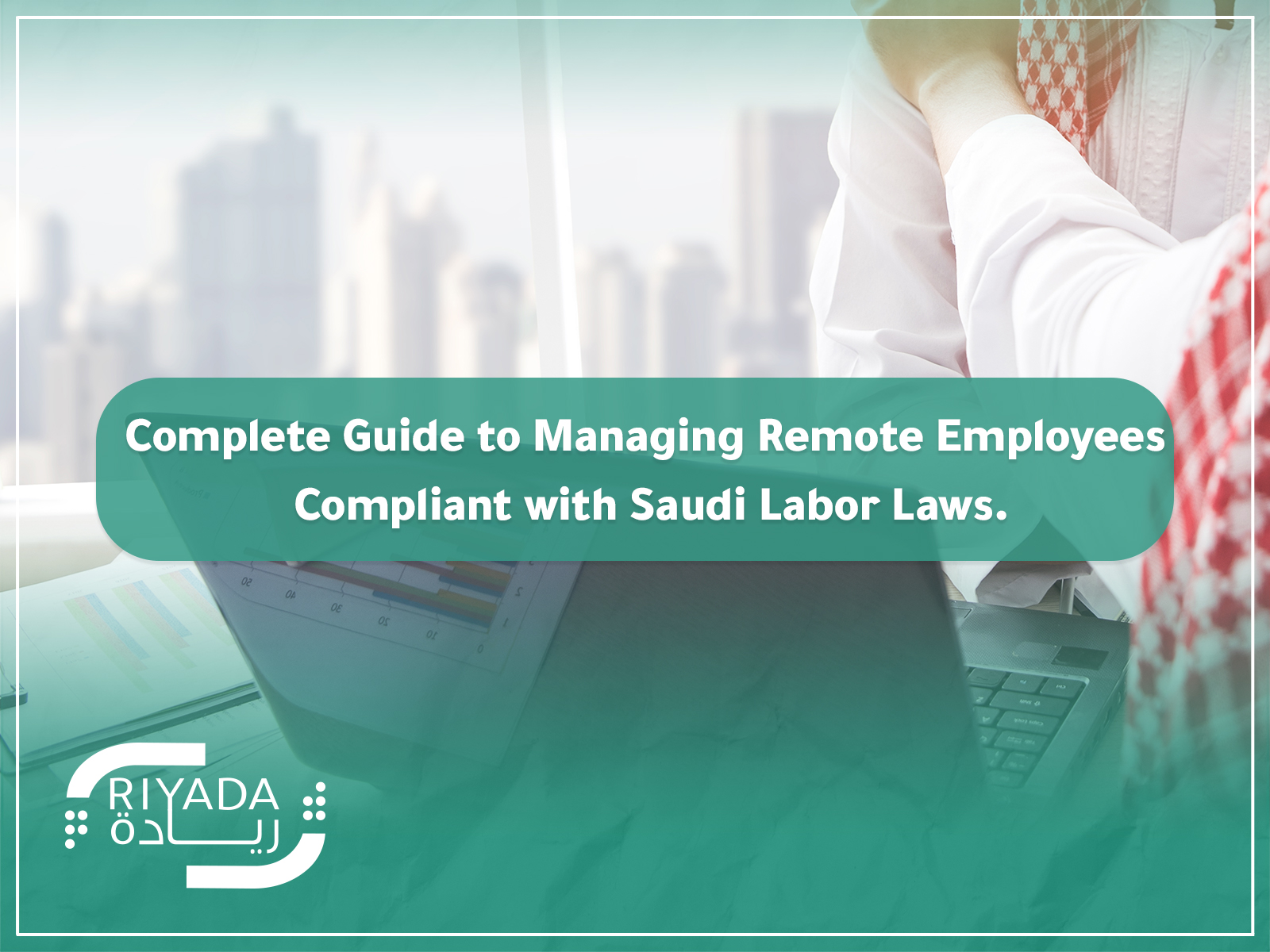
Complete Guide to Managing Remote Employees Compliant with Saudi Labor Laws
Managing remote employees has become a common practice for businesses around the world, including in Saudi Arabia. However, with the rise of Remote Employee Management, companies must ensure they comply with local labor laws while maintaining productivity. That’s where understanding the Complete Guide to Managing Remote Employees Compliant with Saudi Labor Laws becomes essential.
With Remote work Saudi Arabia becoming more prevalent, it’s important for businesses to adopt best practices that align with the Saudi Remote Work System. This guide will help you navigate the complexities of managing remote work teams, while ensuring full compliance with Saudi labor regulations.
In this article, you’ll discover how to organize remote work for companies, the challenges of managing remote employees, and how to use digital tools and flexible work policies to ensure your teams remain efficient and legally compliant, with insights from riyada.
Learn more about: How to Analyze Customer Data to Improve Customer Service?
What are the basics of remote employee management for Saudi companies?

Managing remote employees requires a solid understanding of Remote Employee Management, particularly in the context of Saudi labor laws. The basics of managing remote employees in Saudi Arabia include:
1. Clear Communication
Regular and transparent communication is crucial for remote teams. Set up weekly meetings, clear expectations, and regular check-ins to keep everyone on track.
2. Defined Work Hours and Schedules
Saudi companies should establish clear working hours for remote employees, ensuring they align with Saudi Remote Work System and avoid misunderstandings.
3. Legal Compliance
Companies must ensure that all remote work practices are compliant with Remote Work Employment Laws in Saudi Arabia, including contracts, benefits, and work hours.
4. Performance Tracking
Establishing clear metrics to track remote employee performance is critical to ensure work is being completed efficiently. This includes setting deadlines, milestones, and utilizing tools to monitor productivity.
5. Security and Data Protection
Remote employees may be handling sensitive data. Ensuring that employees follow secure processes and protecting company data is essential in remote work environments.
By adhering to these basics, businesses can build strong foundations for successful remote team management while remaining compliant with Saudi regulations.
The most important challenges of remote work and how to overcome them
While remote work offers flexibility, it also presents several challenges. Understanding these challenges and how to address them is key to maintaining effective remote operations.
1. Communication Barriers
Remote work can lead to communication breakdowns due to physical distance. This can cause delays in decision-making and confusion in task execution.
Solution: Use regular video conferences, chat tools, and collaborative platforms to keep communication clear and consistent.
2. Employee Isolation and Engagement
Remote employees often struggle with feelings of isolation, which can affect their morale and productivity.
Solution: Encourage virtual team-building activities, ensure employees feel connected, and provide regular feedback to maintain engagement.
3. Monitoring Performance
Tracking the performance of remote employees without being intrusive can be challenging.
Solution: Implement Remote Employee Management Tools that provide insight into productivity without being overly controlling. Tools such as time trackers, project management platforms, and automated reporting can assist in tracking progress effectively.
4. Legal Compliance Risks
Failure to align with Remote Work Employment Laws can lead to legal penalties, especially in terms of working hours, contracts, and employee benefits.
Solution: Stay updated with the latest Saudi labor laws and ensure that remote work policies are fully compliant.
5. Maintaining Work-Life Balance
Remote employees often struggle to separate their personal and professional lives, leading to burnout and decreased efficiency.
Solution: Establish Flexible Work Policies that allow employees to manage their work-life balance effectively, setting boundaries and maintaining proper breaks during the workday.
Continue reading about: Call Center Solutions for Multi-Branch Companies
How do cloud systems help track employee performance?
Cloud technology plays a crucial role in remote work by providing businesses with the tools needed to manage teams effectively and efficiently.
1. Real-time Collaboration
Cloud systems allow remote employees to collaborate in real-time, using tools like Google Workspace or Microsoft Teams, which simplifies communication and document sharing.
2. Performance Tracking and Reporting
Cloud-based platforms allow employers to set performance goals, monitor progress, and track key metrics. This includes features like project management tools, time tracking software, and dashboards that provide data on employee performance.
3. Employee Accountability
With cloud systems, you can access employee work logs, track milestones, and gain real-time insights into productivity, making it easier to manage remote teams.
By using cloud systems, companies can ensure that Remote Employee Management remains organized, transparent, and in line with both performance expectations and Saudi labor law.
Get the full story on: How Call Centers Accelerate Sales and Follow-Up Processes in Saudi Arabia
The role of flexible working policies in raising productivity and ensuring compliance
Flexible work policies are essential for remote teams, especially in Saudi Arabia, where maintaining work-life balance is key to long-term employee satisfaction.
1. Enhancing Productivity
Allowing employees to set their own work hours (within set limits) can lead to higher productivity. People tend to be more efficient when they work during their most productive hours, rather than adhering to rigid schedules.
2. Ensuring Compliance with Saudi Labor Laws
Flexible policies must still align with Saudi Remote Work System. This includes respecting maximum work hours, providing necessary benefits, and ensuring that employees are working under the right conditions.
3. Supporting Employee Well-being
Offering flexibility can help employees avoid burnout, reducing turnover and promoting job satisfaction.
Companies that implement flexible work policies can improve Remote Work Saudi Arabia by meeting the needs of employees while ensuring compliance with regulations.
Discover more about: Customized Call Center Services in Saudi Arabia
Digital tools necessary for remote team management
Effective management of remote teams requires the use of the right digital tools. Here are some essential tools for managing remote employees:
1. Communication Platforms
Tools like Slack, Microsoft Teams, and Zoom enable real-time communication, reducing the isolation that can occur in remote teams.
2. Time Tracking Software
Software like Harvest or Toggl allows employers to monitor work hours without intruding on employees’ privacy, helping to ensure compliance with Remote Work Employment Laws.
3. Project Management Tools
Platforms such as Trello, Asana, or Monday.com help assign tasks, track progress, and manage deadlines efficiently, keeping remote employees aligned with business goals.
4. Performance Analytics
Tools like Hubstaff or BambooHR provide insights into employee performance, including productivity tracking and feedback collection.
These digital tools enable businesses to improve Remote Employee Management while staying compliant with legal frameworks.
Explore more on: Call Answering Services in Saudi Arabia
How to ensure full compliance with Saudi labor laws

Ensuring full compliance with Saudi Labor Laws when managing remote employees involves the following key strategies:
1. Create Clear Contracts
Ensure remote employees have contracts that specify work expectations, compensation, benefits, and working hours in compliance with Saudi labor laws.
2. Maintain Record-Keeping
Track hours worked, breaks taken, and overtime in accordance with regulations. Using cloud-based HR tools will ensure you keep accurate records of remote employees’ work.
3. Offer Proper Benefits
Ensure remote workers receive benefits such as health insurance and end-of-service benefits as outlined in Saudi labor law.
4. Monitor Working Hours
Adhere to the maximum number of hours employees can work weekly under Saudi law. Keep track of overtime and make sure employees are not overworked.
By focusing on compliance, businesses can manage Remote Employee Challenges effectively while avoiding legal risks.
Find out more about: Call Center Outsourcing in Saudi Arabia
Best practices to enhance communication and improve team efficiency
Good communication is the cornerstone of any successful remote team. Here are some best practices:
1. Set Clear Expectations
Ensure all team members understand their roles, responsibilities, and deadlines from the start. Clearly define tasks and performance metrics.
2. Use Video Conferencing
Video calls create a more personal connection, build trust, and keep the team aligned on goals.
3. Foster Team Collaboration
Encourage collaboration by creating shared workspaces and channels where employees can communicate easily and share updates.
4. Provide Regular Feedback
Offer constructive feedback regularly, not just during performance reviews, to keep employees motivated and engaged.
read more about: How HR Services Help Improve Business Performance | Cases
Frequently Asked Questions
1. How can companies ensure they comply with Saudi labor laws for remote work?
Companies should stay informed about labor law changes, maintain accurate records, and implement clear contracts and flexible work policies.
2. Are flexible work policies required in Saudi Arabia?
While not mandatory, flexible policies can improve employee satisfaction, boost productivity, and help ensure compliance with Saudi labor laws.
3. What digital tools are most effective for remote team management?
Communication platforms (e.g., Zoom, Teams), time tracking software (e.g., Harvest, Toggl), and project management tools (e.g., Asana, Trello) are essential.
4. How can cloud systems improve remote employee management?
Cloud systems offer centralized data storage, real-time tracking, and increased collaboration, making it easier to manage remote teams and comply with regulations.
5. What are the common challenges of managing remote employees in Saudi Arabia?
Challenges include ensuring compliance with labor laws, maintaining effective communication, and overcoming isolation among employees.
Understanding how to manage remote employees while remaining compliant with Saudi labor laws is essential for businesses operating in today’s digital world. With the right tools, flexible policies, and legal knowledge, companies can enhance productivity and ensure compliance.
If your business is looking for expert advice and support in managing remote teams, riyada provides customized HR solutions that help streamline remote work operations while ensuring full compliance with Saudi labor laws.
Contact riyada today and take your remote team management to the next level.


